- Home
- Jeremy Robinson
Infinite Page 8
Infinite Read online
Page 8
As I stand, alone and quiet in the VCC, I start to wonder why I left.
There are games in VR. Movies. Distractions. Virtual people to interact with.
None of it’s real, I think. As convincing as VR is, some part of me will never accept it as a suitable replacement for reality. And after 217 days inside, bashing my virtual head against Tom’s firewalls, playing countless games developed over the past few hundred years, and watching every conceivable VR movie, even the lewd ones—especially the lewd ones—I’m left feeling hollow.
Empty.
The void inside me is as deep and vast as the one surrounding the Galahad.
“Shit.” My voice echoes. “Shit!”
I want to smash the VR headset on the floor, to vent my real world anger in a physical way, but the tech-jock in me keeps me docile. I leave the VCC, enter the VR staging room, and put my equipment away. The VISA stings as it stretches out my skin and peels away like the duct tape I used when I still lived on Earth. Like screwdrivers, duct tape is no longer really used, but my father swore by the stuff, and I found good uses for it—making bows and arrows, traps, and other real-world contraptions that interested me before I was ‘seduced by the not-real.’ My mother’s words. And she wasn’t entirely wrong. That I have to fight to get the stuck-on virtual skin off of my body says a lot about my personality. My obsession with VR had always been tempered by my humanity, and my shame about the idea of wearing adult diapers, but now…
Two hundred and seventeen days.
A balanced person would have maintained a reasonable schedule. Would have kept showering, and eating, and exercising, and shitting. Needed or not, those are part of what make us human. But the moment I didn’t need them, I gave them up, and for what?
The not-real.
All said and done, once hygiene became a non-problem, I’m not all that dissimilar from Tom. Without the changes to my DNA, ten years in conscious cryo-sleep probably would have driven me insane, too. Then I’d be the one in a diaper nest of congealed shit. Instead, I’m slightly fused to my virtual skin.
But only slightly.
I peel free of it and let my real skin breathe. It’s red and irritated, but only for a moment.
Standing stark naked in front of my locker, I consider going nude. The air is perfectly comfortable, and there’s no one around to judge…or ogle. My altered DNA has given me the unearned physique of an athlete.
What can I do? I wonder. Training for the mission was difficult and included a painful physical regimen. I never enjoyed it. Those two hours a day, lifting weights, running laps and stretching were as close to physical torture as I have ever experienced. It got easier with time, but not much.
But now?
I look down at my body, wondering what it can do.
After dressing in my coveralls, I hit the gym.
The space is vast, twice the size of the VCC, allowing room for a track, which surrounds a collection of torment devices meant to improve the human physique. The arched ceiling is illuminated by a projection of a cloud-filled blue sky fringed by trees and the occasional bird. The psychological effect is nice, but it pales in comparison to the truly virtual.
It’s been a long time, but I remember most of the old training routine. I kick things off with some stretching. It actually feels good, and a measure of peace works its way into my muscles before I set them to work on some push-ups. Back when I was first recruited by Command, my first attempt at push-ups was embarrassing. My arms shook on the second rep, and failed to achieve the third. By the time our mission launched, I could do sixty. In a row.
I was proud of it, like I’d unlocked some kind of gamer achievement, but it was still fewer than all of the men and most of the women. Capria could pound out twice as many.
No wonder she wasn’t interested.
Not that Tom was much better.
Fueled by now ancient shame, I set to the push-ups like a man in a movie montage. At first, I grunt with each push. Then I realize I don’t have to and work in silence. With each push I feel like I’m getting tired, but then on the way down, I feel refreshed. I’m not sweating. Not out of breath. And my muscles show no sign of tiring.
I stop at three hundred, crushing Captain Blair’s two hundred sixty-seven push-up record. I could do this all day.
Exercise, for someone who gets no benefit from it—not even pain—is no fun. It’s like playing a game in God-mode. The lack of challenge discourages me. Self-improvement will not be the distraction I had hoped it would be.
I leave the gym and its artificial sky behind. After so long in VR, I’m beginning to crave it again.
I shake my head, walking through the Galahad’s gleaming hallways, hoping to get lost and then have to solve the mystery of where I am, but every door and intersection is so well labeled, that even that is impossible.
My wandering takes me back to the cryo-chambers. This, at least, provokes some new emotions, which are uncomfortable, but more interesting than the rampaging boredom that is my life. I pause in front of each frigid corpse, warming the glass with my hands and looking at their still faces. Some of them look asleep. Eyelids closed. Bodies relaxed. These were the lucky ones, whose deaths probably happened before they even woke up.
The rest stare back at me in wide-eyed terror, silently screaming, ‘You did this! You killed me!’
“It wasn’t me,” I tell the dead, and then I freeze, hand held to glass, looking down on a face that looks like just another member of the peaceful dead.
But it’s not.
It’s Capria.
Alive.
Still.
I look at her cryo-bed’s control panel. My index finger twitches, lifting, but the rest of my arm denies that small desire to wake her.
I wouldn’t be alone. I could have a real conversation. Hear a real voice besides my own. But how quickly would that conversation take to become horror? I can’t wake her up, not until I turn the Galahad around.
Not until I’ve forgiven her.
I’m in this for the long haul. Tom’s encryption guaranteed it. And until my situation changes, I’m on my own.
“But I don’t have to be.” Ideas I’ve considered and pushed away resurface. I try to find flaws in my logic, but given the circumstances…
“I have a few options,” I tell Capria. “They range in severity. First, I beef up Gal’s AI. Give it a voice. Female, obviously. Make her crush the Turing test. That would be something, at least. Next, I could give her a body. A robot. I know, I know, they’re out of fashion, but it could be done.”
Autonomous robots turned out to be a fad. The uncanny valley came and went just as quickly as people realized that humanoid robots weren’t as good at being human as the real thing. Aside from the sexual deviant, most people lost interest in humanoid robots, and the industry ended where it began. Robots were still used in most other facets of labor, from fine surgery to vast construction and war, but they didn’t co-exist with people the way so many science fiction writers had predicted. But that doesn’t mean I couldn’t build something autonomous for Gal. It would be a strange kind of real-world company, but it would be something.
“It wouldn’t be enough.” I lean my palms on the side of Capria’s cryo-bed, dipping my face down to the glass. Our noses are just twelve inches apart. It’s the closest I’ve ever been to her. And for the first time, her proximity has no effect on me. Her spell has been broken. “I need to escape. From this hell. From you. From all of it.”
Resolve pulls me back up, and I feel like I should say goodbye. This might be the last time I see her, or speak to her.
If it works.
It will work.
The dueling inner monologues annoy me, but propel me from the room without looking back. In a life-everlasting, largely free of challenges aside from solitude, having a goal to work toward feels good. It’s going to take a long time to get right, but unlike Tom’s encryption, I can tackle this problem with my own brain, and solve it in a fraction of the t
ime. Most of the work is already done.
Gal is the most sophisticated AI ever created, some of her code written by me and by Tom. I just need to make her a little better. A little less predictable while steering clear of ambition.
I need to make her creative.
Like a person, but even more so.
AIs have created some of the most stunning pieces of art, both physical and digital, of the modern era. Turns out that what is pleasing to the human eye can be quantified, broken down to ones and zeros, and regurgitated into paintings, sculptures, and drawings capable of provoking profound emotions, despite the creator feeling nothing.
But I need more than that from Gal.
I need her to create. A world. Sounds and smells. That’s the easy part. Ones and zeroes. But the hard part, what no AI has yet to achieve convincingly, is writing a story.
And not just any story. It needs to be as convincing as reality, because it will be my life.
So it needs to be long.
Forever long.
Or at least until my brute force attack on Tom’s security breaks through.
The key is that it needs to be so engaging that, given enough time, I will forget my real life. My years in the Great Escape will become my new reality, all of it constructed by Gal, without me having any part in the story’s construction…but with the outcome being skewed toward happiness, contentment, and peace of mind.
Obviously.
“Goodbye, world,” I say ten minutes later, reentering the VCC in a fresh virtual skin. I place the headset on and jump into the virtual, where Gal’s code can be manipulated. “Hello, world.”
14
What is reality?
The answer should be simple: the physical world humanity experiences through its five senses.
But is it really that easy?
The first problem is that not everyone experiences reality in the same way. Some experience less. The blind. The deaf. And some experience more, seeing hallucinations or feeling phantom limbs after they’ve been amputated. People with synesthesia can see sounds, hear tastes, and feel what they see. Not every mind is the same, and so the definition of reality can shift depending on the observer.
In a way, the ability for the same reality to vary drastically between different people was probably the root cause for some of history’s greatest wars. If everyone on Earth experienced reality in the same way, there would be very little to disagree about.
But people disagree about everything—even facts.
Does God exist?
The answer to what seems like a yes or no question can actually branch out in hundreds of different directions, each with thousands of caveats, disclaimers, and belief systems. For me, the question has always been moot and brings me to the same cosmic question: where did reality come from? I have a hard time believing that an all-powerful being beyond human comprehension willed the universe into existence. But I find it equally preposterous that everything came from nothing, and random chance and chaos led to the creation of a universe full of laws. Granted, ‘nothing’ isn’t the term generally used. It’s closer to ‘everything came from something infinitesimally small and dense,’ which is science-speak for ‘nothing,’ as long as it doesn’t break the laws of physics and does less than nothing. Which is also not scientifically possible.
The debate used to keep me up at night, in part because of the mystery, but also because everyone else around me seemed so certain about the reality they’d decided to back. Choosing to narrow reality into a single belief system, based solely on human experience, seems insane to me.
And perfectly rational. Belief brings order to chaos. Without God, humanity would have never left the trees, or caves, or wherever our ancient ancestors used to hang out. Belief in a higher power came paired with the mind’s evolution. Questioning life and the development of morality is what separated people from the beasts.
Of course, the very same mental acuity that came from asking and answering questions—science—ultimately led to Earth’s undoing, and left me stranded on the Galahad.
“Move on,” I tell myself, manipulating Gal’s code while contemplating the nature of reality. I would normally try to clear my mind while coding, but creating a convincing reality is my current goal. And if I can’t simulate the strange ebb and flow of the real thing, I’m never going to forget that it’s all phony.
Phillip K. Dick, one of the few classic science fiction writers I’ve read, explained reality as, ‘that which, if you stop believing in it, does not go away.’
That’s what I need to create.
That’s what I need Gal to create for me.
I’m not building a virtual world, I’m building the architect. The composer. The writer.
I’m building God.
“Okay, that’s too far,” I say to myself. I’m ultimately undecided about the God thing, but on the off chance the universe wasn’t a cosmic accident, I don’t really want to offend its creator. And since I very well might be one of two remaining human beings, the Galahad might very well be the Omniscient’s sole focus.
“Sorry,” I say to Maybe-God. “It’s not that I don’t appreciate what you made, you know, if you actually made it, but I’m done. This—” I wave my hands around the VR space, but indicating the real world I know surrounds me, including Galahad and the vast nothing surrounding the ship, “—is too much. Seriously. Forever separate. Forever alone. This is hell, and I’m not even dead.”
I stop the dance that is coding, which I can do while debating the nature of reality and the possibility of God.
The word ‘hell’ has a profound effect on me.
Since conjuring my great escape plan, I’ve felt a little lighter. Like there is hope.
But the concept of hell smothers all of that.
And not the fire and brimstone variety. From what I understand of the Christian mythos, Hell, while sometimes described as a lake of fire, isn’t really a realm of physical torture. It’s simply giving people what they want in life—separation from God. From connection. From purpose. During a normal life span, being free from the constraints of those things can feel good. Liberating.
But when faced with eternity…
Separation from connection is hell.
And I’m there.
I make a mental note to incorporate this concept into Gal, and recommence work on one of many algorithms that once set free, will become more complex than I can comprehend.
Gal will be as close to sentient as possible, but lacking any ambition aside from my blissful existence within the faux reality of her creation. She will have access to all of human history, knowledge, and creativity, which I hope will give her the ability to conjure a new reality that is both believable, and not simply a rehashing of past events or fictions.
She needs to write a new story.
My story.
“There,” I say, looking over the bits of code hovering in space around me. All the composite parts of Gal. When I step back and look at the numbers and letters, it’s like staring at the night sky, wondering what it all means. I never did that. Space always seemed kind of boring to me. Fixed. I get that the universe is expanding and evolving all the time, but from my perspective, it’s unchanging. Even now that I’m immortal, the grand design of the universe will never shift fast enough to surprise me. But Cap never saw it that way. Where I saw sameness, she saw possibility.
It was one of the things I liked about her.
Past tense.
“Here’s what you can’t do with the universe, Cap.” Grabbing bits and pieces of code, I fill in Gal’s gaps, making her creative, compassionate, and something close to alive, but not quite—not enough to feel the loneliness of her existence. Unlike Maybe-God, I could never do that to my creation. Gal will never view herself as something more, or deserving of more. It’s a mercy not granted to mankind. Lack of ambition. It’s why animals are so content, and why Gal will be as well.
The arrangement of numbers, letters, and symbols wo
uld look like random nonsense to most people, save for a few elite tech-jocks. It’s my life’s best work, and it only took me…
I have no idea how long I’ve been in the VCC, writing code, running unit tests, and writing more code, while automated tests pounded my infrequent errors into submission. I’m still aware of the real world. Still smelling that slight tinge of ozone. But I’ve lost all track of the fourth dimension. Time, while working on this code, this masterpiece that only I will ever get the chance to appreciate, has ceased to exist.
I nearly ask Gal, but hold my tongue.
I don’t want to know. Whether the number is measured in days or years, it will give me no joy, relief or comfort.
That will be Gal’s job.
But not until I’m sure she’s working, both in the real world and the virtual. And that requires leaving the VCC for a time.
I save Gal’s upgraded code to a temp simulation folder. Her new protocols can be activated with a voice command, and if I sense any errors, I can roll her back to Command’s stable version with a second voice command.
The VR headset sticks a little as I pull it off my head and blink my eyes. Reality seems duller than it used to, like the contrast needs to be cranked up, but that’s just the VCC’s low light, or at least I think it is. In some ways, my mind is already adapting to VR as its new reality, making the real world feel like the simulation.
I look around the dimly lit VCC, my eyes struggling to adjust, still seeing after-images of letters and numbers. Now that the virtual skin isn’t sending me sensory information, it feels a little stiff. Going to hurt taking it off.
One last time, I think, and I head for the staging room.
Stripped bare, skin stinging, I forgo getting dressed and hit the showers.
The hot water feels good. It’s one of the last real-life pleasures, probably because I’ve only done it a few times in the last…however long I’ve been lost in space. I’m tempted to ask again, but I refrain. The temporal dimension is my enemy. For me, time no longer matters.

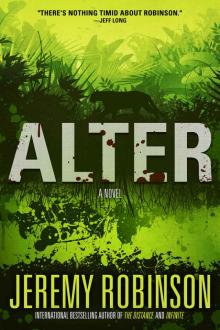 Alter
Alter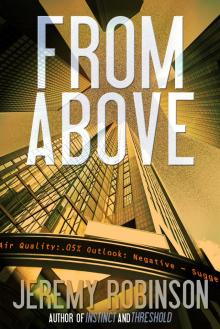 From Above - A Novella
From Above - A Novella Flux
Flux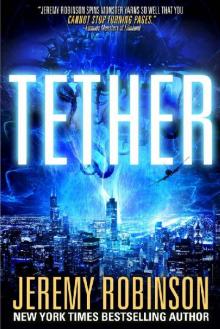 Tether
Tether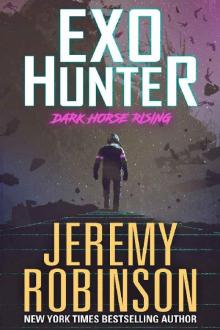 Exo-Hunter
Exo-Hunter Pulse
Pulse Cannibal
Cannibal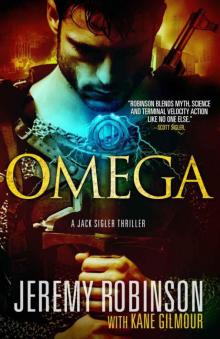 Omega: A Jack Sigler Thriller cta-5
Omega: A Jack Sigler Thriller cta-5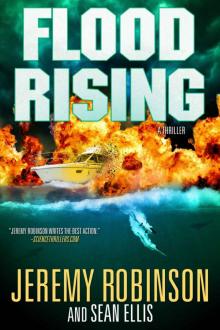 Flood Rising (A Jenna Flood Thriller)
Flood Rising (A Jenna Flood Thriller)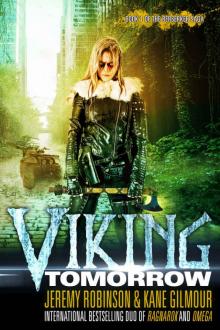 Viking Tomorrow
Viking Tomorrow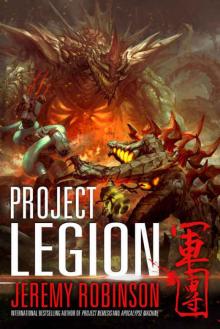 Project Legion (Nemesis Saga Book 5)
Project Legion (Nemesis Saga Book 5)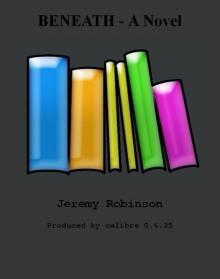 BENEATH - A Novel
BENEATH - A Novel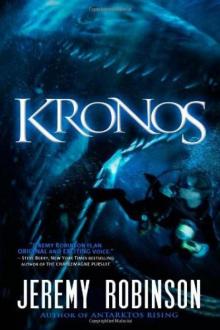 Kronos
Kronos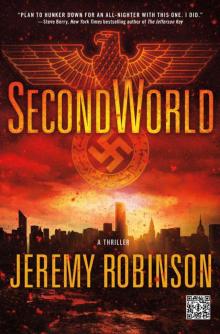 SecondWorld
SecondWorld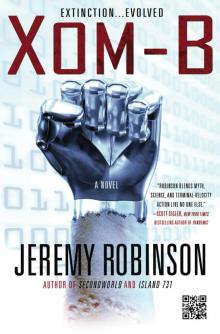 XOM-B
XOM-B Forbidden Island
Forbidden Island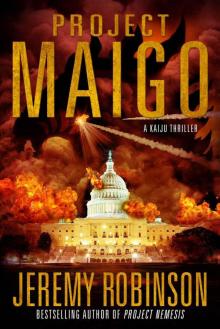 Project Maigo
Project Maigo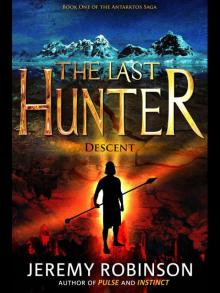 The Last Hunter - Descent (Book 1 of the Antarktos Saga)
The Last Hunter - Descent (Book 1 of the Antarktos Saga)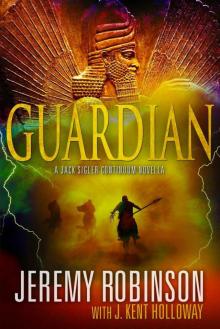 Jack Sigler Continuum 1: Guardian
Jack Sigler Continuum 1: Guardian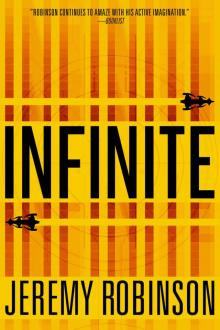 Infinite
Infinite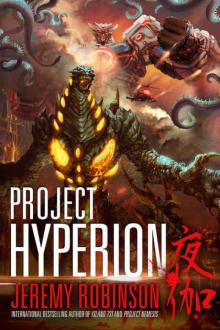 Project Hyperion
Project Hyperion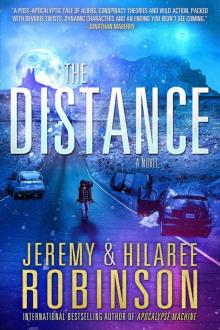 The Distance
The Distance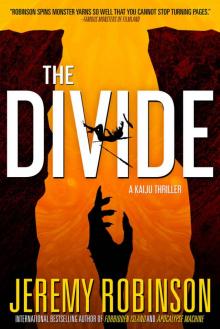 The Divide
The Divide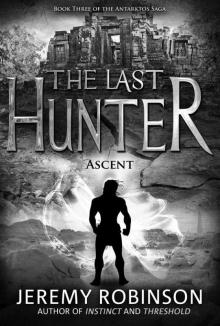 The Last Hunter - Ascent (Book 3 of the Antarktos Saga)
The Last Hunter - Ascent (Book 3 of the Antarktos Saga)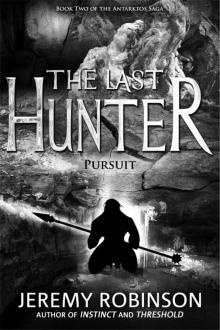 The Last Hunter - Pursuit (Book 2 of the Antarktos Saga)
The Last Hunter - Pursuit (Book 2 of the Antarktos Saga)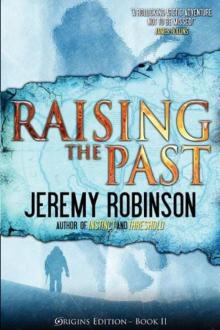 Raising the Past
Raising the Past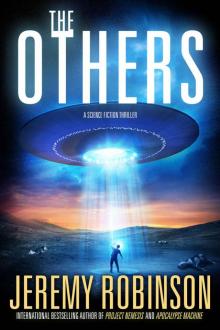 The Others
The Others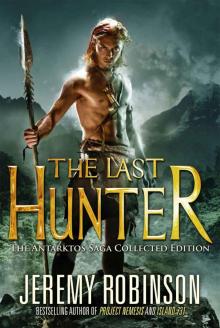 The Last Hunter - Collected Edition
The Last Hunter - Collected Edition Threshold
Threshold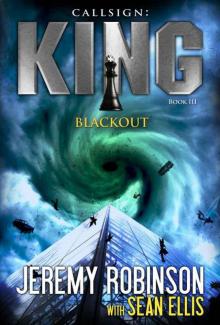 Blackout ck-3
Blackout ck-3 Antarktos Rising
Antarktos Rising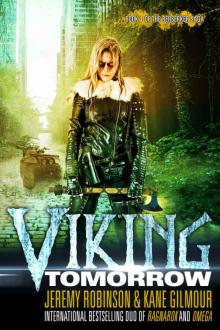 Viking Tomorrow (The Berserker Saga Book 1)
Viking Tomorrow (The Berserker Saga Book 1)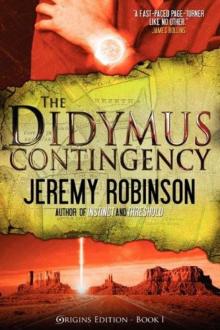 The Didymus Contingency
The Didymus Contingency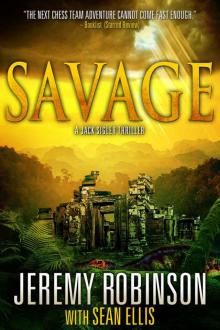 Savage (Jack Sigler / Chess Team)
Savage (Jack Sigler / Chess Team)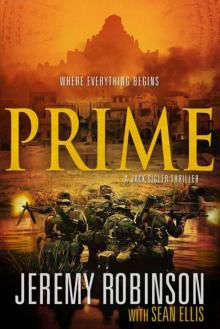 Prime
Prime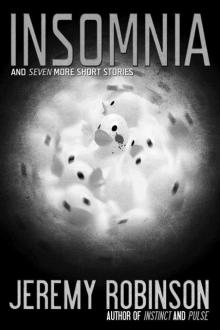 Insomnia and Seven More Short Stories
Insomnia and Seven More Short Stories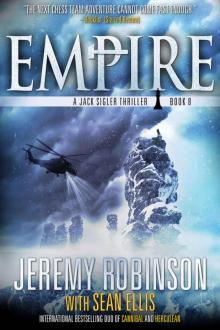 Empire (A Jack Sigler Thriller Book 8)
Empire (A Jack Sigler Thriller Book 8)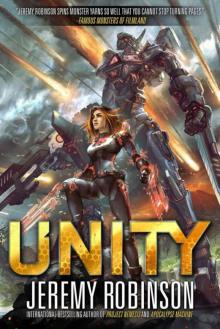 Unity
Unity Instinct
Instinct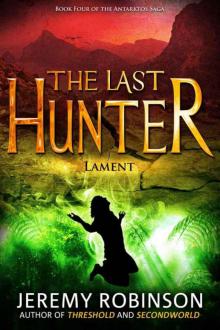 The Last Hunter - Lament (Book 4 of the Antarktos Saga)
The Last Hunter - Lament (Book 4 of the Antarktos Saga)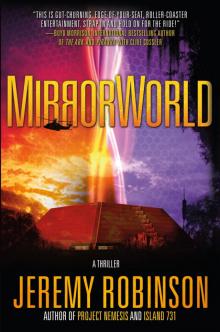 MirrorWorld
MirrorWorld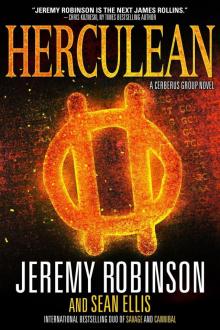 Herculean (Cerberus Group Book 1)
Herculean (Cerberus Group Book 1)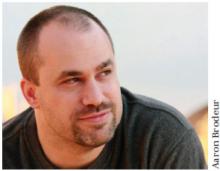 Island 731
Island 731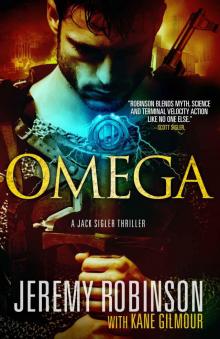 Omega: A Jack Sigler Thriller
Omega: A Jack Sigler Thriller Patriot (A Jack Sigler Continuum Novella)
Patriot (A Jack Sigler Continuum Novella)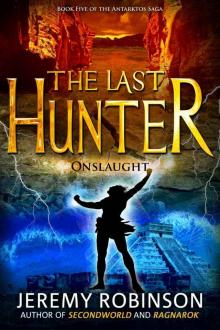 5 Onslaught
5 Onslaught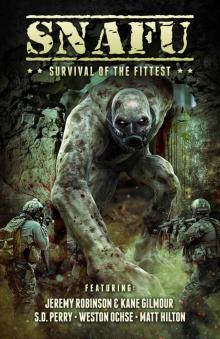 SNAFU: Survival of the Fittest
SNAFU: Survival of the Fittest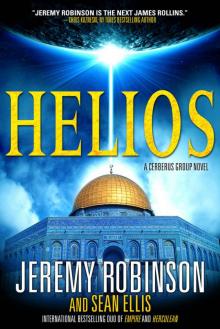 Helios (Cerberus Group Book 2)
Helios (Cerberus Group Book 2)